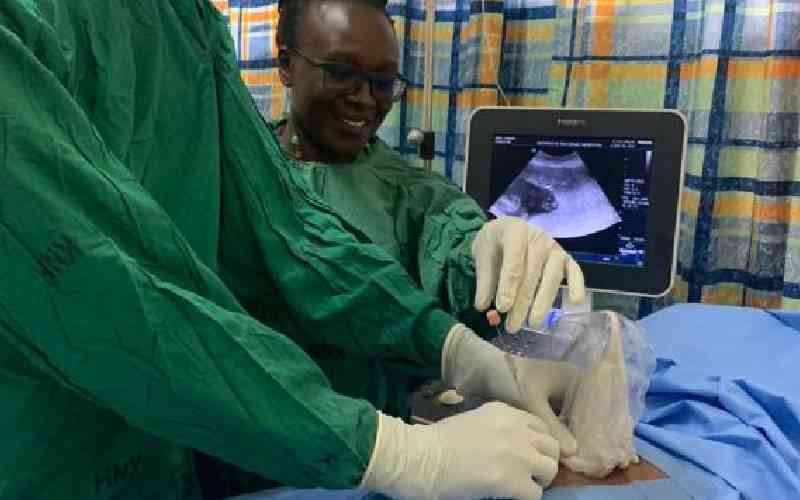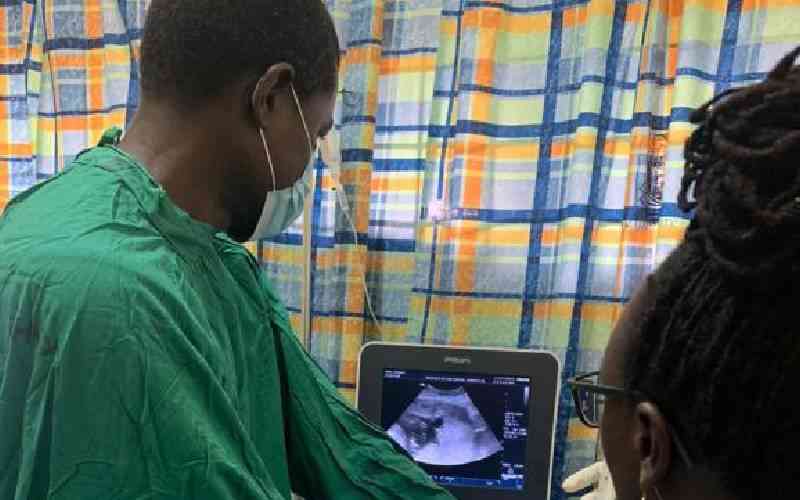
A team of doctors including Rosa Chemwey, Flavia Ogutu, Ikol Adung'o and Kunjira Murayi at the Kenyatta National Hospital has achieved a significant breakthrough by performing an Intrauterine Fetal Transfusion on an unborn baby.
This complex procedure involves delicately injecting red blood cells from a donor into the foetus while still in the mother's womb.
It is a highly intricate technique that may be recommended when a fetus has anaemia (low red blood cell count).
According to a statement sent to newsrooms by KNH, during the procedure, the mother received antibiotics, local anaesthesia, and IV sedation, which also helped sedate the foetus.
Using the guidance of an ultrasound to determine the position of the fetus and placenta, the surgeon precisely located the position of the foetus and placenta.
There are two methods to perform fetal blood transfusions. In both, a needle is inserted into the mother's abdomen.
In Intravascular transfusion (IVT), blood is transfused into the umbilical cord while in Intraperitoneal transfusion (IPT), blood is transfused into the foetus' abdomen. The latter is not very common.
In its statement, KNH did not indicate which of the two methods were used.
- KNH, Murang'a hospitals overrun as Kiambu strike pushes patients across counties
- KNH surgeons set world record with 20.8kg breast reduction surgery
- KNH unveils reconstructed face of boy after groundbreaking surgery
- How KNH doctors restored smile to orphaned boy by performing complex reconstruction surgery
Keep Reading

"A fine needle was then cautiously inserted through the mother's abdomen and into the umbilical vein or the foetus's abdomen," the statement read.
"Compatible red blood cells were then gently transfused into the foetus through the needle. This process may need to be repeated at regular intervals until the foetus is ready for delivery. According to the specialists, the procedure takes between 30 minutes to an hour," KNH says.
According to the hospital, the success of this life-saving procedure is vital for the mother, who faced previous complications in her pregnancy.
"The mother only has one baby, the last two died of a blood complication known as haemolytic disease of the new-born," Dr Chemwey said while referring to the disease where a baby's red blood cells break down quickly.
"We are indeed very determined to ensure this particular pregnancy succeeds. We hope for positive outcomes. The baby is 25 weeks, three days old."
"We transfused between 80-100mls of packed red cells. The blood is special as it is O- negative," Dr Chemwey added.
Kenyatta National Hospital Chief Executive Officer Evanson Kamuri hailed the KNH team for the milestone.
"This is a fetal medicine and institutional landmark. We have attained yet another achievement in fulfilling our mandate as a top premier referral hospital," he said
According to a 2021 study done at Cambridge University, fetal survival rates after intrauterine transfusion through the umbilical cord is more than 90 per cent for foetuses that do not have hydrops, a life-threatening condition in which a foetus or newborn has an abnormal build-up of fluids in the tissues around the lungs, heart, abdomen or under the skin.
For foetuses with hydrops, the study found a success rate of about 75 per cent.
 The Standard Group Plc is a multi-media organization with investments in media
platforms spanning newspaper print
operations, television, radio broadcasting, digital and online services. The
Standard Group is recognized as a
leading multi-media house in Kenya with a key influence in matters of national
and international interest.
The Standard Group Plc is a multi-media organization with investments in media
platforms spanning newspaper print
operations, television, radio broadcasting, digital and online services. The
Standard Group is recognized as a
leading multi-media house in Kenya with a key influence in matters of national
and international interest.











